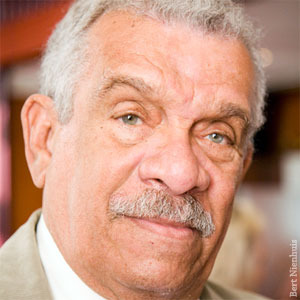Derek Walcott2009 Presenters

Derek Walcott
Derek Walcott, poet, playwright; Distinguished Visiting Professor in Literature and Drama, the University of Alberta, Canada, and professor emeritus in the Creative Writing Department, Boston University, Massachusetts;1992 Nobel laureate in literature
A prolific poet, playwright, and theorist, Derek Walcott is perhaps best known for his epic poem Omeros, a reworking of Homeric story and tradition into a journey around the Caribbean and beyond to London and the American West. In 1992 he was awarded the Nobel Prize in literature “for a poetic oeuvre of great luminosity, sustained by a historical vision, the outcome of a multicultural commitment.”
Walcott was born in 1930 in the town of Castries, on the Caribbean island of St. Lucie, one of the Windward Islands in the Lesser Antilles. His experience of growing up on an isolated volcanic island and ex-British colony has had a strong effect on his life and his work. After studying at St. Mary’s College on his native island and at the University of the West Indies in Jamaica, he moved in 1953 to Trinidad, where he worked as a theatre and art critic. For many years he divided his time between Trinidad and Boston, where he taught literature and creative writing at Boston University until his retirement from full-time teaching in 2007. In 1959 Walcott founded the Trinidad Theatre Workshop, which has produced most of his plays. He founded the Boston Playwrights’ Theatre in 1981 with the hope of creating a home for new plays. His honors include a MacArthur Foundation “genius” award, a Royal Society of Literature award, and , in 1988, the Queen’s Medal for Poetry. He is an honorary member of the American Academy and Institute of Arts and Letters.
Walcott has always felt himself deeply rooted in Caribbean society, with its cultural fusion of African, Asiatic, and European elements, and has endeavored to create an indigenous Caribbean drama. Fellow poet Robert Brodsky used island and ocean images to describe his work: “For almost 40 years his throbbing and relentless lines kept arriving in the English language like tidal waves, coagulating into an archipelago of poems without which the map of modern literature would effectively match wallpaper.”